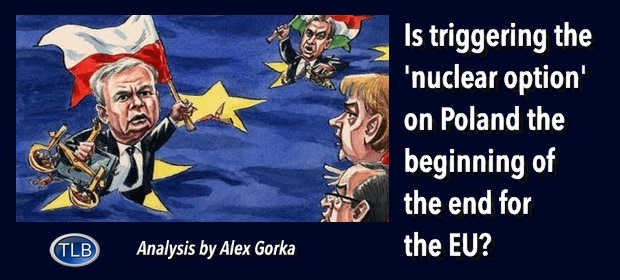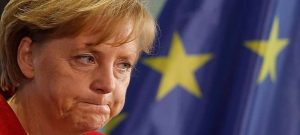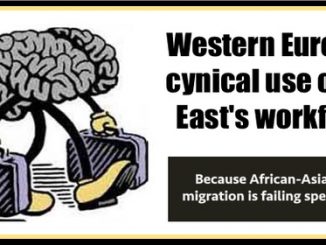
Poland Hit by ‘Nuclear Option’: Brussels Makes Polexit Feasible
ALEX GORKA
The European Commission has decided to suspend Poland’s voting rights in the EU after two years of dispute over judicial reforms that Brussels says undermine Polish courts’ independence. The Commission believes that “Judicial reforms in Poland mean that the country’s judiciary is now under the political control of the ruling majority. In the absence of judicial independence, serious questions are raised about the effective application of EU law.” One of the reforms was the government’s move to grant the president greater powers to appoint judges to the Supreme Court, whose duties include confirming election results. German Chancellor Angela Merkel and French President Emmanuel Macron had publicly agreed to back Article 7 proceedings against Poland before the Commission’s meeting.
The executive branch of the EU triggered Article 7 of the Lisbon Treaty, popularly known as ‘the nuclear option’. The procedure could eventually lead to Poland losing its voting rights in the EU. The European Commission has taken an unprecedented step in the history of the bloc. This is the first time an EU member will face legal procedures for non-compliance with the rules established by Brussels. One senior EU diplomat told the Financial Times it was a momentous decision to “cross the Rubicon”. The Commission will now ask the other EU governments to declare that Poland’s changes to the judiciary constitute a breach of law.
As the standoff escalates, EU officials are separately considering limiting access to EU funds in the post-2020 budget for any country that disrespects the bloc’s values. Brussels has pledged to deliver a total of 229 billion euros ($271 billion) in aid to Poland through 2021.
EU governments, meeting in the Council of the European Union, will hear Poland out and discuss further steps. But if 22 out of 28 members (a majority of four-fifths) and the European Parliament are not satisfied in the end, the process will move on to the next stages, which may mean punitive measures. Warsaw has been given three months to correct the situation; otherwise it risks the prospect of coming under sanctions, including the suspension of voting rights and EU financial transfers. Poland is the biggest beneficiary of European funds aimed at improving living standards.
Poland’s newly appointed Prime Minister, Mateusz Morawiecki, has explained that he is committed to the judicial reforms and has warned that Poland will not “allow ourselves to be blackmailed”. He believes that the move is being taken to punish Warsaw for its refusal to take in more refugees.
EU’s First Vice President Frans Timmermans said he was acting “with a heavy heart” but was  obliged to take action to protect the Union as a whole. According to him, “As guardians of the treaty, the Commission is under a strict responsibility to act … If the application of the rule of law is left completely to the individual member states, then the whole of the EU will suffer.” European Council President Donald Tusk, a Polish citizen, said that “Poland is currently seen as a force for disintegration of the European Union (EU) and hence it is important to end the destruction of Warsaw’s reputation.”
obliged to take action to protect the Union as a whole. According to him, “As guardians of the treaty, the Commission is under a strict responsibility to act … If the application of the rule of law is left completely to the individual member states, then the whole of the EU will suffer.” European Council President Donald Tusk, a Polish citizen, said that “Poland is currently seen as a force for disintegration of the European Union (EU) and hence it is important to end the destruction of Warsaw’s reputation.”
The step against Poland – one which may herald the future fracturing of the EU – is being taken at a time the UK is on its way out of the bloc and the EU institutions are battling a rise in Eurosceptic nationalism across the Old Continent. With sanctions in force and hard pressure exerted by Brussels on the immigrants’ issue, Polexit may not be so far away. Other members facing the same problems may follow the example to trigger a chain reaction and make the “European unity” become history.
Fierce differences of opinion have been evident in some of the disputes between Western and Central Europe. The Visegrad Group, made up of Poland, Hungary, the Czech Republic and Slovakia, is an alliance inside the EU. Hungary has already declared that it would not support such a motion against Poland. It even threatened to use the right of veto if such a decision were taken. The European Parliament adopted a resolution in May 2017 saying there was “a serious deterioration” of the rule of law and democracy in Hungary and calling on the EU to trigger Article 7, but the process has not yet started. The Czech Republic and Slovakia may also side with Poland.
Poland and Hungary support strengthening the role of the national parliaments in European politics and ensuring the proper application of the principle of subsidiarity. They point out the need to concentrate on securing external borders and oppose the EU’s quota system for refugees, emphasizing that this problem should be tackled at national level.
In February, the European Parliament adopted three resolutions on strengthening centralization of the bloc. One of the resolutions proposes limiting or even totally abolishing the right of individual member states not to comply with collective decisions – just exactly what the Visegrad group members so vehemently oppose.
The divisions inside the EU have triggered discussions of the ways to move further creating multi-speed Europe.
The idea boils down to EU integration in subgroups, which is already de facto happening. But the creation of subgroups means breaking up the much-vaunted unity.
Poland and Hungary are not the only targets for “punishment”.
Romania could face penalties from the European Union similar to the procedure launched against Poland this week if it presses ahead with the changes to its judicial system. Romania’s Senate has also approved a bill that is part of a widely-condemned judicial overhaul, which is also considered to be an attempt by politicians to take control of the justice system. The move has been criticized by the European Commission.
 German Chancellor Angela Merkel seems to have failed to form a coalition with Germany’s Free Democrats (FDP) and the Social Democrats. The end of Merkel’s era is in sight. Germany may be moving to a snap election and there is a big chance Angela Merkel will not lead her party, being blamed for the prolonged political crisis. Another chancellor may review Germany’s EU policy with ensuing institutional reforms to reform the bloc. The stance on the relations with the countries of Central Europe as well as Russia may alter. Germany’s Free Democratic Party (FDP), the Alternative for Germany (AfD), the Left-wing party (Die Linke), and the German Social Democratic Party (SPD) – all of them are calling for improving the relations with Moscow.
German Chancellor Angela Merkel seems to have failed to form a coalition with Germany’s Free Democrats (FDP) and the Social Democrats. The end of Merkel’s era is in sight. Germany may be moving to a snap election and there is a big chance Angela Merkel will not lead her party, being blamed for the prolonged political crisis. Another chancellor may review Germany’s EU policy with ensuing institutional reforms to reform the bloc. The stance on the relations with the countries of Central Europe as well as Russia may alter. Germany’s Free Democratic Party (FDP), the Alternative for Germany (AfD), the Left-wing party (Die Linke), and the German Social Democratic Party (SPD) – all of them are calling for improving the relations with Moscow.
If a new election is held sometime in March, the outcome will be by and large the same as it was in September. Unlike French President Macron, a new chancellor will not enjoy strong support from the ruling party in parliament. Many things will change. The bloc will have to reform or face the threat of disintegration. The triggered “nuclear option” is ringing an alarm bell for the European Union.
************
Original article
ER recommends other articles by Strategic Culture Foundation




